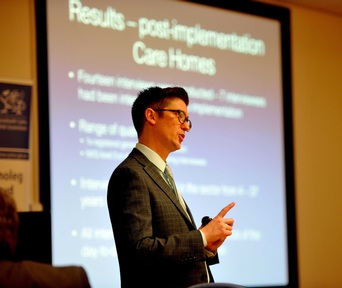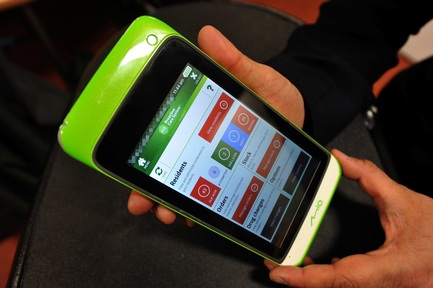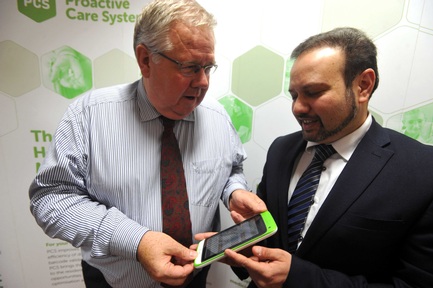Care home medication management errors could be 'virtually eradicated' by new technology
Care home residents are being put at risk by up to 55 errors per week, in the management of their prescribed medication, a study conducted by Cardiff University has revealed.
Researchers found that even in some of the top performing care homes in Wales, the safety and well-being of at least one resident was likely to be affected by four errors in the management of prescribed medicines each week. While in the worst performing homes, the number rose to 55 errors per week for one resident.

Presenting the research at a symposium at the Cardiff School of Pharmacy and Pharmaceutical Sciences, lead researcher on the study, Dr Mat Smith, commented: “The management of medicines in care homes is notoriously difficult. There are significant challenges associated with safety, quality and accountability in medicines administration and record keeping, with serious threats posed to the vulnerable patients in our care homes.
“Our evaluation has shown that many of these risks can be reduced by implementing the system and enabling pharmacists to make proactive and consistent interventions, which ultimately have a positive effect on patient safety.
“Furthermore, the evaluation has shown that millions of pounds could be saved by making informed decisions on stock levels and reducing the amount of medicine that goes to waste.”
Improving the quality and safety of care within care homes and reducing waste
The research revealed different types of error being made by care homes using a paper-based medication administration record (MAR) charts. These included: a resident’s medicine dose not being recorded on the relevant charts, no record of the time a dose was given, and medicine stock levels not matching those on record.
The study noted that when care home staff began using a technology based system for managing medication, 21 of 23 errors were completely eradicated and another reduced by 88 per cent.
The errors that remained were linked to GP prescribing instructions which could not be influenced by technology or the care home in question.
Health and Social Services Minister for Wales, Mark Drakeford said: “This new way of working is improving the quality and safety of care within care homes and reducing waste – not just wasted medicines but also wasted staff time.
“Ordering and managing medicines in a care home can be a full-time job, which is time that could be better spent caring for residents.”

The study was funded by the Welsh Government’s Health Technology Telehealth Fund and offers the most significant research into care home medication management since the Department of Health’s 2009 ‘Care Home Use of Medicines Study’.
Chair of Beacon Digital, Professor Clive Bowman, added: “The Welsh Government-supported Beacon Digital Healthcare project has successfully shown that in addition to improving safety, modernisation through technology can reduce waste and facilitate the development of professional support by pharmacists for care home residents.”
Researchers from Cardiff University’s School of Pharmacy and Pharmaceutical Sciences studied 30 care homes in South Wales in order to discover how technology could improve resident safety in care homes and help reduce medicine waste.
They compared MAR charts with the ‘Proactive Care System’, a system which allows staff to scan barcodes using a hand-held device to identify each resident and ensure his or her prescribed medication is being correctly administered and maintained.
Providing real-time resident specific information to pharmacists
Developed by Bristol healthcare technology company, Invatech Health, the Proactive Care System, offers real-time resident specific information to pharmacists who are able to check for medication prescribing errors to improve resident safety.
All 16 pharmacists who participated in the study revealed they had to intervene on 80 per cent of care home prescriptions. Of those interventions, half were to double check a prescription against another resident’s records at the pharmacy before the medication was dispensed. Twenty per cent of interventions were to check new medication that did not match a resident’s record at the care home, and just 10 per cent were related to new prescriptions that replaced or interacted with existing medication being taken.
Ensuring residents receive their medication safely and in a personalised way
Tower Hill Care Home in Penarth uses the Proactive Care System and has already seen the advantages of incorporating technology into medication management. Registered manager at home, Amy Curtis, explained: “Medication rounds are more efficient and take less time now. Staff have peace of mind in knowing that the new system helps them to ensure that all of the important tasks associated with medicines administration are completed and our residents receive their medication safely and in a much more personalised way.”

The research further highlighted the Proactive Care System’s potential to reduce prescription waste.
Of the number of returned medicines and overstocked medication in 26,000 care homes during the trial period, wastage was estimated at between £6m and £12m each year. During the trial using the Proactive Care System, the cost of returned and overstocked medicines in care homes was reduced by 55 per cent and 22 per cent respectively.
Researchers highlighted that if applied across Wales, the system could save between £3.2m and £4.6m annually.
Chief executive of Ivatech Health, Tariq Muhammed, added: “Ensuring the safe management of medicines is vital for every care home, and this research by Cardiff School of Pharmacy provides independent evidence of how technology can improve the safety and wellbeing for elderly residents. We are proud to have been associated with it.”
For more information on the Proactive Care System, visit: www.getpcs.co.uk/
Latest News Analysis
 04-Sep-19
Extra £1.5 billion announced for social care in Chancellor's Spending Review
04-Sep-19
Extra £1.5 billion announced for social care in Chancellor's Spending Review
 02-Jul-19
Department of Health forced to rethink care homes' nursing rates after legal challenge
02-Jul-19
Department of Health forced to rethink care homes' nursing rates after legal challenge
 18-Jun-19
Overnight care workers forced to sleep in offices and told 'bring your own bedding'
18-Jun-19
Overnight care workers forced to sleep in offices and told 'bring your own bedding'
 14-Jun-19
Back in the closet: Third of care home staff have had no LGBT+ awareness training
14-Jun-19
Back in the closet: Third of care home staff have had no LGBT+ awareness training
 11-Jun-19
PM candidates on social care: Rory Stewart calls fixing care an 'unfinished revolution'
11-Jun-19
PM candidates on social care: Rory Stewart calls fixing care an 'unfinished revolution'